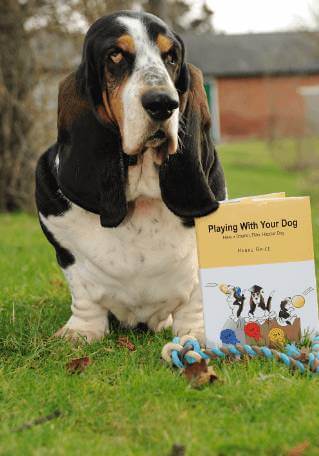
Christmas is typically our busiest time of the year for training new puppies, that’s because owners are understandably keen to get a head start before the onset of festivities. However, in December 2014 we broke all records for the number of training sessions conducted – with over 100 hours of training with puppies alone. So what was the most common goal for each new owner? To have a puppy that is “happy and well mannered”.
Thanks to the advances into canine behaviour, trainers and dog owners alike can benefit from the almost weekly publication of research produced by leading Universities relating to our four-legged friends. One recent study, conducted by Bristol University concluded that of all the things we humans do to help our puppies lead happy lives, play is the most important.
Of the 4,000 dog owners surveyed in this study, 94 percent revealed that they experience behavioural issues with their dogs and of those, 80 percent of dog owners said they play with their dogs less than six times a day. Those dogs that did not engage in a lot of play suffered from behavioural issues which included anxiety and aggression. The study also showed that less play time led to an increase in whining, jumping up, and not coming when called.
The correlation between lack of play and dog behaviour issues is one that is often underestimated, researchers believe. This is a theory that I also subscribe to. That’s because over the years I have had the pleasure of working with many owners and their dogs, yet time and time again I would spot correlations between the types of behavioural issues they were experiencing – and – the lack of appropriate daily mental stimulation provided for the dog. It was this correlation that led me to write the book ‘Playing With Your Dog’. The book focuses on play for puppies, teens, adults and old dogs because playing is a lifelong source of critical stimulation, whatever the age of your dog.
An important factor to consider is that puppies do not learn to develop good manners simply by ‘going for a walk’. Instead they learn through play. Think about it – the first things we learn are learnt through playing; that bouncy red ball that escaped you so many times at the beach was the key to developing the coordination that lets you eat food, tie your shoelaces, even fly a jet aircraft. As we grow up we play less and less, but when we remember the adage about ‘all work and no play’ and go outside with a ball, we feel revived and enthusiastic. Your dog is only too happy to help you feel like this all the time.
Dogs are social creatures, they are not prone to self-amuse instead they have an insatiable need to interact with us – and even develop clever ways to prolong play with their humans. Has your dog ever ‘teased’ you by bringing the ball back to you, to only then run away when you’ve reached down to retrieve it? This is a great way of prolonging the playtime, it’s simply your pooch’s way of keeping you engaged and playing with him.
According to the theory of Neoteny which looks at how some genetic variants retain juvenile characteristics into adulthood, one of the reasons why we enjoy the company of dogs so much is because they are playful throughout their lives.
While having regular play routines encourages exercise and therefore helps to keep our dogs fit, the Bristol University study also found that such routines are more about giving dogs the critical social interaction needed to help frustrated, moody or troubled puppies become happier. Furthermore, the scientists proved that when regular play routines are introduced, the bad behaviours cease.
Playing allows your dog to use his natural behaviours, boosting his fitness and cognitive skills. It promotes the release of ‘happy’ hormones, so unsurprisingly many owners see a reduction in bad behaviours once they introduce regular play routines. But playing can be so much more than simply throwing a ball – check out my book for ideas.
And remember, just as playing helped us to make friends when we were young, it can help you bond with your dog too. You may even find that they share your love of football, tennis or tug of war, even if they don’t have a great grasp of the rules!
Learn more about our classes

Get Hanne's book, clothing and more
Hanne has a number of publications including her book Playing With Your Dog to help owners work out the games that are best suited for their pet to play throughout his life, from puppyhood to old age, available from Amazon. Check out Hanne's range of contemporary casuals The Collection – for pet lovers made from recyclable, organic materials that are sustainably sourced.

